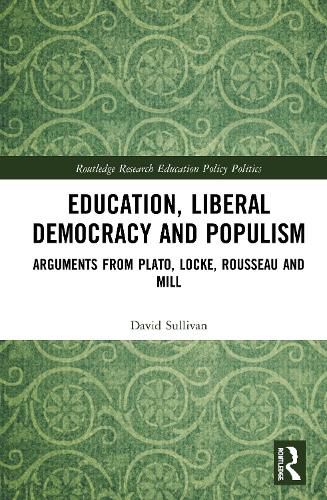Readings Newsletter
Become a Readings Member to make your shopping experience even easier.
Sign in or sign up for free!
You’re not far away from qualifying for FREE standard shipping within Australia
You’ve qualified for FREE standard shipping within Australia
The cart is loading…






Education, Liberal Democracy and Populism: Arguments from Plato, Locke, Rousseau and Mill provides a lucid and critical guide shedding light on the continuing relevance of earlier thinkers to the debates between populists and liberals about the nature of education in democratic societies.
The book discusses the relationship Rousseau and Plato posited between education and society, and contrasts their work with the development of liberal thinking about education from John Locke, and John Stuart Mill’s arguments for the importance of education to representative democracy. It explores some of the roots of populism and offer a broader perspective from which to assess the questions which populists pose and the answers which liberals offer. The book makes a substantial contribution to the current debate about democracy, by emphasising the central importance of education to political thought and practice, and suggests that only an education system based on liberal democratic principles can offer the possibility of a genuinely free society.
This book is ideal reading for researchers and post-graduate students in education, politics, philosophy and history. It will also be of great interest to Educational practitioners and policy makers.
$9.00 standard shipping within Australia
FREE standard shipping within Australia for orders over $100.00
Express & International shipping calculated at checkout
Education, Liberal Democracy and Populism: Arguments from Plato, Locke, Rousseau and Mill provides a lucid and critical guide shedding light on the continuing relevance of earlier thinkers to the debates between populists and liberals about the nature of education in democratic societies.
The book discusses the relationship Rousseau and Plato posited between education and society, and contrasts their work with the development of liberal thinking about education from John Locke, and John Stuart Mill’s arguments for the importance of education to representative democracy. It explores some of the roots of populism and offer a broader perspective from which to assess the questions which populists pose and the answers which liberals offer. The book makes a substantial contribution to the current debate about democracy, by emphasising the central importance of education to political thought and practice, and suggests that only an education system based on liberal democratic principles can offer the possibility of a genuinely free society.
This book is ideal reading for researchers and post-graduate students in education, politics, philosophy and history. It will also be of great interest to Educational practitioners and policy makers.